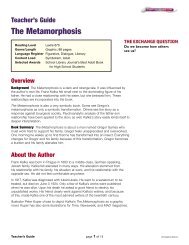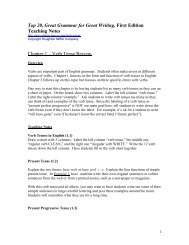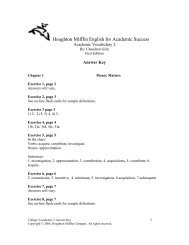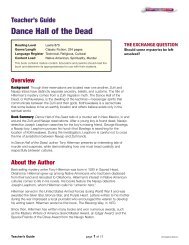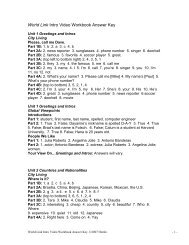Crazy Loco
Crazy Loco
Crazy Loco
You also want an ePaper? Increase the reach of your titles
YUMPU automatically turns print PDFs into web optimized ePapers that Google loves.
<strong>Crazy</strong> <strong>Loco</strong><br />
Pages 142–175 Answers for Before You Move On<br />
Pages 142 – 175<br />
PAGE 157<br />
1. Plot Reread page 142. Why does Pedro have to become an<br />
altar boy?<br />
Pedro’s father is the mayor. He wants Pedro to volunteer<br />
because he thinks it will help him get re-elected.<br />
2. Comparisons Reread page 157. Pedro did not want to be<br />
an altar boy. How does he feel about it now?<br />
Pedro is excited because Father Pedro told him he is ready<br />
for Sunday mass. He knows there will be a lot of people<br />
watching him.<br />
PAGE 175<br />
1. Inference Reread pages 160–162. Ricardo and José care<br />
about Pedro. How can you tell?<br />
Ricardo and José help Pedro when he falls during Sunday<br />
mass. They stop people from laughing at Pedro and making<br />
fun of him at school.<br />
2. Conclusions Why does Pedro decide to help José paint<br />
the church?<br />
Pedro wants to help José remember and honor Ricardo’s life.<br />
Respond to Pages 142–175<br />
Student Journal, page 13<br />
1. Personal Response Pedro’s father volunteers him to be an altar boy.<br />
What kind of activities do your friends or family think you should be a<br />
part of? How do their opinions affect your actions?<br />
2. Author’s Purpose Why do you think the author chose to write this<br />
book as a short story collection instead of as a novel? Use the word<br />
collection in your response.<br />
3. Irony Why is it ironic that Ricardo and José take their positions as<br />
altar boys so seriously?<br />
Teacher’s Guide page 8 of 15 © Hampton-Brown<br />
What If?<br />
<strong>Crazy</strong> <strong>Loco</strong><br />
The author wrote this book as a short story collection<br />
because the plots of the stories are concise. The stories are<br />
contained tales about growing up. A novel would be longer<br />
and would not be concise.<br />
It is ironic because they are both tough men who have been<br />
in trouble with the law. You wouldn’t think that they would<br />
care about church-related responsibilities. They look and<br />
act tough, but they sincerely care about helping the priest.<br />
4. Connect Look at your notes on Student Journal, page 2. Think about what might<br />
happen if you suddenly had a serious responsibility. Compare this to <strong>Crazy</strong> <strong>Loco</strong>. How<br />
does responsibility affect the characters in three of the stories?<br />
Respond to Pages 142–175, continued<br />
Student Journal, page 14<br />
5. Character Pedro shares his experiences as an altar boy in “Last<br />
Mass.” Write Pedro’s actions as an altar boy in the Sequence Chain.<br />
Sequence Chain<br />
1.<br />
3.<br />
5.<br />
tries to hide<br />
when his father<br />
volunteers him<br />
trips over his<br />
cassock and spills<br />
holy water<br />
helps with the<br />
mass for Ricardo<br />
How does Pedro change from the beginning to the end of the story?<br />
2.<br />
4.<br />
6.<br />
is trained by<br />
Ricardo and<br />
José<br />
slowly stops<br />
helping at the<br />
church<br />
is going to<br />
help José paint<br />
the church<br />
<strong>Crazy</strong> <strong>Loco</strong><br />
At first, Pedro does not want to help at the church and<br />
does a bad job. At the end of the story, he is confident about<br />
helping at the church and is more respectful and proud.



